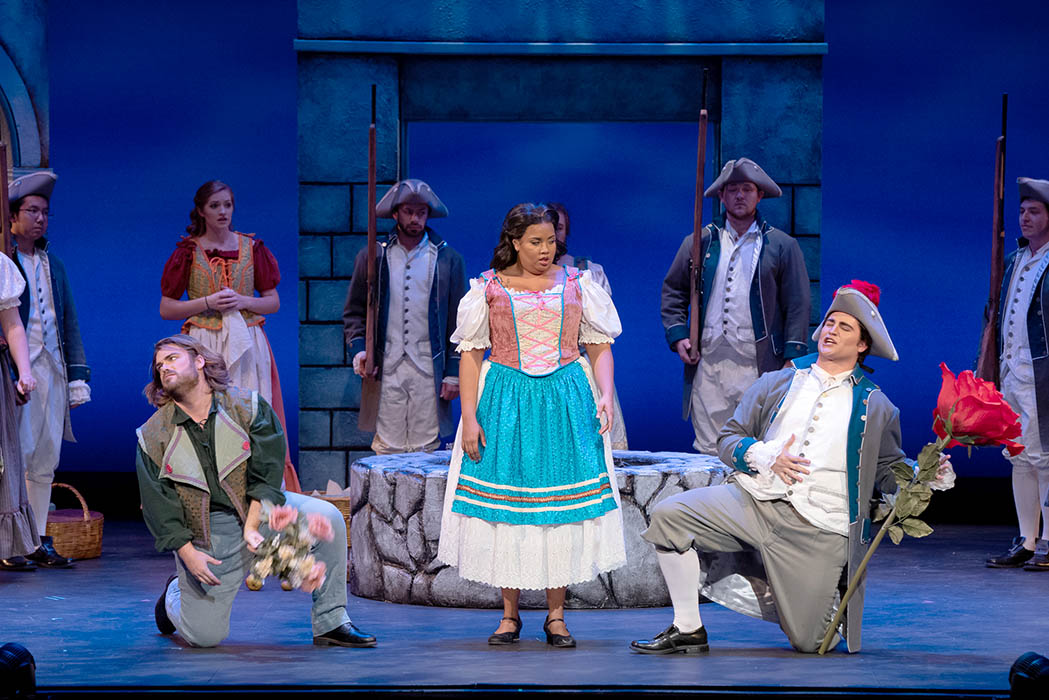Throughout its 187 year history, Gaetano Donizetti’s bel canto comedy The Elixir of Love (L’elisir d’amore) has remained high on the list of most-performed operas worldwide. This popularity comes at a price, though, as opera companies search for ways to invigorate Donizetti’s admittedly airy and light-hearted work to interest contemporary audiences already familiar with the work. For director James Marvel and the University of Tennessee Opera Theatre’s production of Elixir last weekend, their approach was not to find a new milieu for the opera’s action, but rather to energize a generic one with choreographic comedy, while elevating the dramatic role of the chorus to a distinct “quirky-character” status—one that added to, and complemented, the four leading roles.
As was usual with UTOT productions, the four performances were double cast—split between the matinee and evening performances—in the lead characters of Adina and Nemorino, as well as in the supporting character of Giannetta.The result was a highly homogenous group of performances that differed only in the individual qualities of the singers in the leading roles.
In the “evening” cast, the role of the beautiful and rich landowner, Adina, was sung by soprano Adia Evans-Ledon, who was making her debut with UTOT. Evans-Ledon showed off a big, beautifully projected voice nuanced with an attractive edge and sparkle that made listening to her a joy. Opposite her as the shy, bumbling Nemorino was tenor Wayd Odle, a voice familiar to UTOT and Knoxville Opera audiences. However, there was nothing shy or bumbling about Odle’s vocal performance on Saturday evening. His Act II “Una furtiva lagrima,” the vocal high point of Elixir, was sung with a beautiful dramatic arc—and with all the plaintive elegance it deserves.

In the “matinee” cast, Adina was sung by soprano DeLaine Crutchfield, also making her UTOT debut. Crutchfield led her Adina through a marvelous dramatic range, from the arrogant girl of Act I to her recognition of true love at the climax. Her performance—notably the Act I aria “Della crudele Isotta”—was a persuasive blend of youthful spark and lovely Donizetti lyricism. Crutchfield’s Nemorino was tenor Miles Jenkins, a veteran of UTOT. Jenkins impressively captured the spirit of the sadly naive Nemorino, a victim of unrequited love, in a character of classic style that steadfastly refuses to accept defeat.

Also new to UTOT in the role of Dr. Dulcamara, the traveling peddler of “Elixir,” was the marvelous bass-baritone Matt Huckaba. His portrayal of Dulcamara was a joy to watch, from his apparent innate sense of comic timing, to his ability to do physical comedy with an effortless stylishness. His Dulcamara, sporting a rich and powerful voice, was also a joy to listen to. Huckaba is one actor/singer to keep an eye out for in the future.
Baritone Derek Stull was the Belcore in both casts, giving the role a charisma and arrogant swagger that was an integral part of his lady’s man persona. As befitting this, his sexualized integration with the women in the chorus was quite the comic bit. Also heavily integrated with the chorus was the secondary role of Giannetta, sung by Emily Deyton in the matinee cast and Whitney Wells in the evening cast. Both were electric, high-energy, sassy portrayals, given quite a bit of humorous stage business and comic side-storytelling by director Marvel.

Again, a definite highlight of this Elixir was the chorus of village people and soldiers—a chorus made into a separate character by director Marvel with comic bits and sub-bits, often with references to past productions and inside jokes. The result of this “chorus characterization” gave the flow of the opera its own visual life and energy separate from the score.
And speaking of the score—Kevin Class led a demonstrably improved and impressive UT Opera Orchestra in the Bijou pit in performances that were not only professionally consistent, but also beautifully rendered as an ensemble.
The UT Opera Theatre’s next production is a double bill of Menotti’s The Old Maid and the Thief and Amelia Goes to the Ball—April 17-19, 2020, at the Bijou Theatre.








